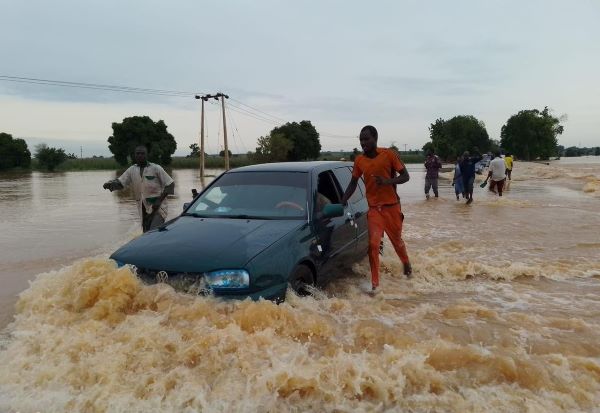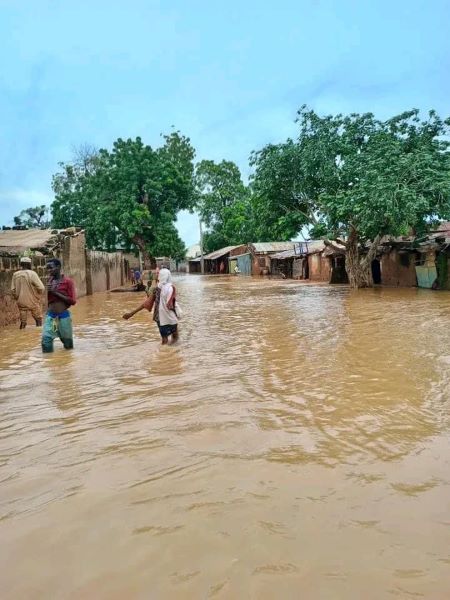Despite the trillions of naira expended in the fight against insecurity in Nigeria, farmers in Sokoto State remain trapped in a desperate struggle, unable to cultivate their lands due to relentless banditry and floods. The once-thriving farmlands of Takpani, Alikiru, and Tsamiya villages have become inaccessible as bandits continue to terrorize the region, forcing farmers and their families to seek refuge elsewhere.
By Gift Ovuede
For over six years, farmers displaced from these villages have been living in Rahama Housing Estate in Gandi town, Rabah Local Government Area. These once-prosperous farmers now find themselves unable to work their lands, leaving them without the means to support their families.
Lives uprooted, livelihoods lost
Abubakar Musa, a farmer from Takpani village, recalls the days when he could cultivate his three farmlands, producing over a hundred bags of millet each season. Today, those farmlands lie abandoned, overrun by bandits.
“When I cultivated my farms during the farming season, and God gave me an increase, I could harvest over a hundred bags of millet,” Musa shared with a heavy heart. “But since we fled our villages to seek refuge in this camp, I no longer have access to my farms, and I can’t make money to take care of my family like before.”
Similarly, Ibrahim Takpani, another farmer from the same village, had over seven farmlands that he worked on. He and over six hundred others have been displaced from their homes due to constant banditry attacks.
“Most of the men from my village are farmers and cattle rearers with numerous farmlands and animals deserted due to the activities of these bandits,” Ibrahim lamented.
Umar, a rice farmer from Takpani village with over ten farmlands, used to harvest over three hundred bags of rice during a successful farming season. His crops provided a steady income that sustained his family. Now, like so many others, he has lost access to his land and, with it, his livelihood.
“The bandits have taken over our village, and we have no choice but to flee. We are now at the mercy of the government and kind-hearted people who help us survive”, he said.
The impact of insecurity on food security
The ongoing banditry in Sokoto State has led to a severe food shortage and a steep hike in food prices. A food security expert, who wished to remain anonymous, confirmed the dire situation to ASHENEWS.
“The recent food shortage can only be linked to the many farmlands in local governments that are currently not cultivated due to insecurity,” the expert explained. “As long as we have fewer farmlands cultivated, food production will be low, leading to food shortages in the state.
“If urgent and deliberate steps are not taken to ensure these uncultivated farmlands are put to use for agricultural activities, the issue of food shortage may not go away anytime soon, especially as the population continues to increase”, he said.
The displacement of farmers from their lands has ripple effects that extend far beyond individual livelihoods. The inability to cultivate land and produce crops is directly contributing to the escalating food crisis in Sokoto State, where staple foods such as millet, rice, and maize are becoming scarce and increasingly expensive.
Floods compound the crisis
In addition to the insecurity caused by banditry, natural disasters like floods are also taking a toll on Sokoto’s agricultural sector. In Sanyinna, Tambuwal Local Government Area, farmlands worth millions of naira have been submerged by floods.
The floods have also displaced hundreds of people and caused extensive damage to houses and livestock. It would be recalled that the Nigerian Hydrological Services Agency had predicted that in this year’s annual flooding outlook, 31 states with 148 LGAs would be within the high flood-risk areas, while 35 states, including the FCT and 249 LGAs, were considered within the moderate flood-risk areas. The remaining 377 LGAs were forecasted for the low flood-risk areas.
The volume of water which is now increasing has forced the temporary closure of the Sanyinna, Argungu, and Birnin Kebbi roads, as well as the Kwadarko bridge, disrupting transportation and isolating communities. Eyewitnesses say for about five decades they never experienced such a flood.

A resident of the village described the situation as devastating in a phone interview with ASHENEWS. “Dozens of houses and animals are underwater, and people have been displaced. We have never seen such floods in about five decades.”
Eyewitnesses, some of whom have lived in the area for over sixty years, described the flood as unprecedented in its magnitude. The community is now appealing to the government and relief agencies for assistance, including boats for safe crossing and basic necessities for the displaced.
A call for urgent action
The twin threats of banditry and floods are crippling Sokoto’s agricultural sector and pushing the region towards a deeper food crisis. The farmers who once fed their families and contributed to the state’s economy are now among the most vulnerable, relying on aid and uncertain of their future.
The state government, alongside federal authorities, must take immediate and decisive action to address the insecurity that has driven farmers from their lands. Additionally, comprehensive flood management strategies are essential to prevent future disasters from further decimating the already struggling agricultural sector.
As the rainy season continues and the bandits remain at large, the people of Sokoto are left to wonder when they will be able to return to their farms and rebuild their lives. Without urgent intervention, the dreams of these farmers may be washed away, just like their crops in the rising floodwaters.


